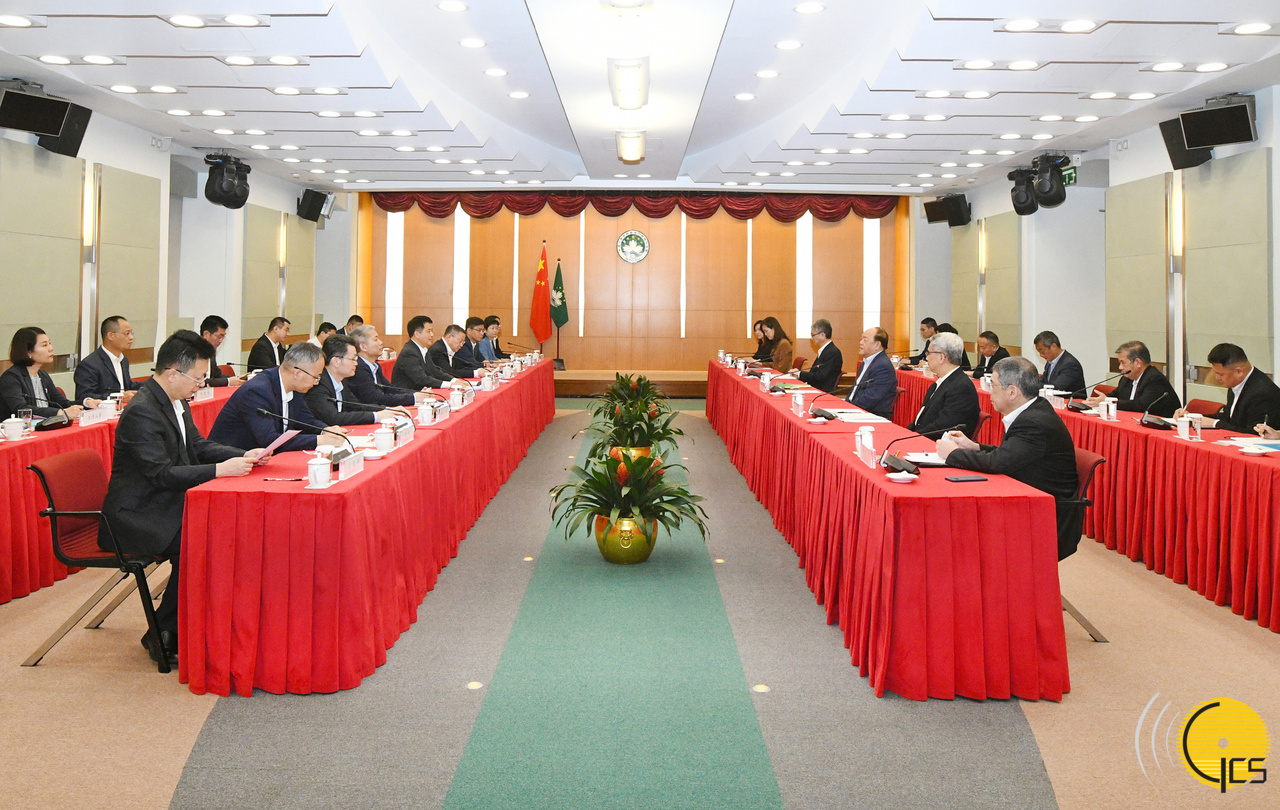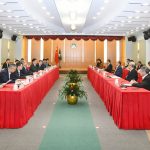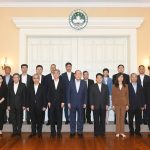 The Chief Executive, Mr Ho Iat Seng, attends a working meeting with deputy secretary of the CPC Zhuhai Municipal Committee and Mayor of Zhuhai, Mr Huang Zhihao.
The Chief Executive, Mr Ho Iat Seng, attends a working meeting with deputy secretary of the CPC Zhuhai Municipal Committee and Mayor of Zhuhai, Mr Huang Zhihao.
The Chief Executive, Mr Ho Iat Seng, met with officials from Zhuhai, to exchange views on matters related to: joint pandemic prevention and control; economic recovery; construction of the Guangdong-Macao Intensive Cooperation Zone in Hengqin; talent development; and railway transport connectivity.
A working meeting with the Deputy Secretary of the Zhuhai Municipal Committee of the Communist Party of China (CPC) and Mayor of Zhuhai, Mr Huang Zhihao, was held on Monday (30 May) at the Government Headquarters in Macao.
During the meeting, the Chief Executive said that the Zhuhai-Macao joint prevention and control mechanism continued building on its capabilities, achieving notable successes in pandemic prevention and control work in the two cities; enabling Macao residents to live with peace of mind.
At present, there were more than 300,000 traveller arrivals and exits per day through various boundary checkpoints between Zhuhai and Macao, meaning it was not easy to maintain success in terms of pandemic prevention and control. The two cities had to optimise their anti-pandemic policies, to ensure smooth and safe boundary-crossing operations, said Mr Ho.
Apart from effective pandemic control, the Government of the Macao Special Administrative Region (MSAR) was committed to facilitating Macao’s economic recovery. The Chief Executive thanked the Zhuhai Government for gradually relaxing the time validity for the nucleic acid test result required of boundary-crossing travellers. It was hoped there could be further such relaxation in response to residents’ needs, and in order to improve travel and economic activities between the two cities, which would bolster residents’ confidence.
Economic recovery relied on joint consideration, determined effort, cooperation, and synergy between Zhuhai and Macao, added Mr Ho.
The Chief Executive briefed Zhuhai officials on a series of livelihood-relief measures implemented in Macao since the beginning of this year, including the Wealth Partaking Scheme, personal income tax rebates, the third round of the Electronic Consumption Benefits Plan, and the temporary subsidies to encourage employers to hire unemployed residents. Mr Ho said he hoped to see more tourists visiting Macao, so the city could regain its vitality.
During the meeting, the Secretary for Administration and Justice, Mr Cheong Weng Chon; the Secretary for Security, Mr Wong Sio Chak; the Secretary for Social Affairs and Culture, Ms Ao Ieong U; and the Secretary for Transport and Public Works, Mr Raimundo do Rosário, each gave a presentation on progress regarding Zhuhai-related work under their purview.
In his speech at the meeting, the Mayor of Zhuhai, Mr Huang, said that pandemic prevention and control was still the most important task. Zhuhai and Macao had achieved great success in pandemic prevention and control, with the two cities maintaining close communications and cooperation.
Zhuhai would always bear in mind its original mission to facilitate Macao’s adequate economic diversification. Zhuhai would also spare no effort in: securing supplies of agricultural products for Macao; continuing to strengthen the system for ensuring supply of water to Macao; and in expediting modification and upgrading of the Gongbei boundary checkpoint. Zhuhai would also promote railway transport connectivity; accelerate the establishment of a training base between the cities; deepen talent exchange and cooperation; and offer full support to the construction of the Guangdong-Macao Intensive Cooperation Zone in Hengqin. These steps were in order to maintain Macao’s long-term stability and prosperity, and support Macao’s integration into the national development plan, said Mr Huang.
Under the framework of the Guangdong-Macao Cooperation Joint Conference, it was hoped that the mechanisms of the Zhuhai-Macao Cooperation Conference – including the three-party liaison mechanism involving Zhuhai, Macao, and the Guangdong-Macao Intensive Cooperation Zone in Hengqin – would be optimised.
In response to Mr Huang’s remarks, the Chief Executive said that the MSAR Government had formulated a contingency plan for any large-scale COVID-19 outbreak. Referring to mainland China’s success in anti-pandemic measures, he said Macao would if necessary implement grid management within residential areas, and apply measures to ensure supplies of daily necessities.
The Chief Executive agreed to enhance communication via the three-party liaison mechanism established by Zhuhai, Macao, and the Guangdong-Macao Intensive Cooperation Zone in Hengqin. Macao would join forces with Zhuhai to promote exchanges of civil servants, engage in talent development, and advance railway transport connectivity. This was in the hope of deepening existing close liaison between the two cities.
Other Macao officials attending the meeting included the Chief-of-Office of the Chief Executive's Office, Ms Hoi Lai Fong; the Director of Civil Aviation, Mr Chan Weng Hong; and the Director of the Policy Research and Regional Development Bureau, Mr Cheong Chok Man.
Others in attendance included Member of the Hengqin Working Committee of Guangdong of the Guangdong-Macao Intensive Cooperation Zone in Hengqin, and Deputy Director of the Intensive Cooperation Zone’s Executive Committee, Mr Fu Yongge; member of the Standing Committee of the CPC Zhuhai Municipal Committee, Head of the United Front Work Department of Zhuhai, and Vice Secretary of the Leading Party Members' Group of the Zhuhai Municipal Committee of the Chinese People's Political Consultative Conference (CPPCC), Mr Guo Caiwu; Member of the Standing Committee of the CPC Zhuhai Municipal Committee, and Deputy Mayor of Zhuhai, Mr Guo Lishi; and Deputy Mayor of Zhuhai, Mr Li Chong.



